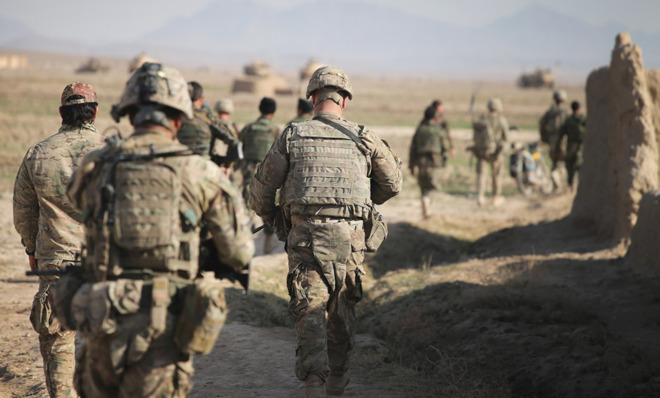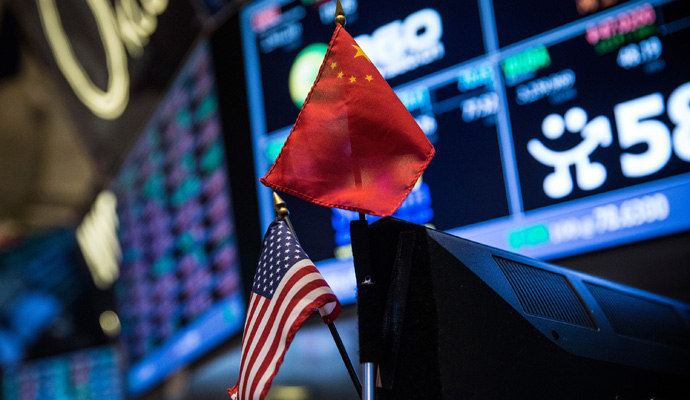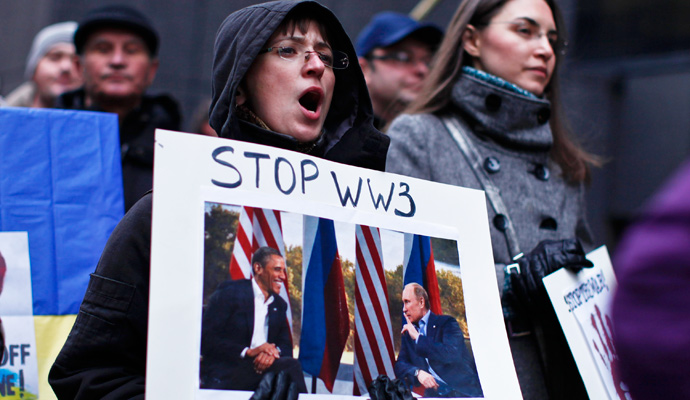Don't worry: World War III will almost certainly never happen
To borrow a phrase from finance, global trade has simply become too big to fail

A free daily email with the biggest news stories of the day – and the best features from TheWeek.com
You are now subscribed
Your newsletter sign-up was successful
Next year will be the seventieth anniversary of the end of the last global conflict. There have been points on that timeline — such as the Cuban missile crisis in 1962, and a Soviet computer malfunction in 1983 that erroneously suggested that the U.S. had attacked, and perhaps even the Kosovo War in 1999 — when a global conflict was a real possibility. Yet today — in the shadow of a flare up which some are calling a new Cold War between Russia and the U.S. — I believe the threat of World War III has almost faded into nothingness. That is, the probability of a world war is the lowest it has been in decades, and perhaps the lowest it has ever been since the dawn of modernity.
This is certainly a view that current data supports. Steven Pinker's studies into the decline of violence reveal that deaths from war have fallen and fallen since World War II. But we should not just assume that the past is an accurate guide to the future. Instead, we must look at the factors which have led to the reduction in war and try to conclude whether the decrease in war is sustainable.
So what's changed? Well, the first big change after the last world war was the arrival of mutually assured destruction. It's no coincidence that the end of the last global war coincided with the invention of atomic weapons. The possibility of complete annihilation provided a huge disincentive to launching and expanding total wars. Instead, the great powers now fight proxy wars like Vietnam and Afghanistan (the 1980 version, that is), rather than letting their rivalries expand into full-on, globe-spanning struggles against each other. Sure, accidents could happen, but the possibility is incredibly remote. More importantly, nobody in power wants to be the cause of Armageddon.
The Week
Escape your echo chamber. Get the facts behind the news, plus analysis from multiple perspectives.

Sign up for The Week's Free Newsletters
From our morning news briefing to a weekly Good News Newsletter, get the best of The Week delivered directly to your inbox.
From our morning news briefing to a weekly Good News Newsletter, get the best of The Week delivered directly to your inbox.
But what about a non-nuclear global war? Other changes — economic and social in nature — have made that highly unlikely too.
The world has become much more economically interconnected since the last global war. Economic cooperation treaties and free trade agreements have intertwined the economies of countries around the world. This has meant there has been a huge rise in the volume of global trade since World War II, and especially since the 1980s.
Today consumer goods like smartphones, laptops, cars, jewelery, food, cosmetics, and medicine are produced on a global level, with supply-chains criss-crossing the planet. An example: The laptop I am typing this on is the cumulative culmination of thousands of hours of work, as well as resources and manufacturing processes across the globe. It incorporates metals like tellurium, indium, cobalt, gallium, and manganese mined in Africa. Neodymium mined in China. Plastics forged out of oil, perhaps from Saudi Arabia, or Russia, or Venezuela. Aluminum from bauxite, perhaps mined in Brazil. Iron, perhaps mined in Australia. These raw materials are turned into components — memory manufactured in Korea, semiconductors forged in Germany, glass made in the United States. And it takes gallons and gallons of oil to ship all the resources and components back and forth around the world, until they are finally assembled in China, and shipped once again around the world to the consumer.
In a global war, global trade becomes a nightmare. Shipping becomes more expensive due to higher insurance costs, and riskier because it's subject to seizures, blockades, ship sinkings. Many goods, intermediate components or resources — including energy supplies like coal and oil, components for military hardware, etc, may become temporarily unavailable in certain areas. Sometimes — such as occurred in the Siege of Leningrad during World War II — the supply of food can be cut off. This is why countries hold strategic reserves of things like helium, pork, rare earth metals and oil, coal, and gas. These kinds of breakdowns were troublesome enough in the economic landscape of the early and mid-20th century, when the last global wars occurred. But in today's ultra-globalized and ultra-specialized economy? The level of economic adaptation — even for large countries like Russia and the United States with lots of land and natural resources — required to adapt to a world war would be crushing, and huge numbers of business and livelihoods would be wiped out.
A free daily email with the biggest news stories of the day – and the best features from TheWeek.com

In other words, global trade interdependency has become, to borrow a phrase from finance, too big to fail.
It is easy to complain about the reality of big business influencing or controlling politicians. But big business has just about the most to lose from breakdowns in global trade. A practical example: If Russian oligarchs make their money from selling gas and natural resources to Western Europe, and send their children to schools in Britain and Germany, and lend and borrow money from the West's financial centers, are they going to be willing to tolerate Vladimir Putin starting a regional war in Eastern Europe (let alone a world war)? Would the Chinese financial industry be happy to see their multi-trillion dollar investments in dollars and U.S. treasury debt go up in smoke? Of course, world wars have been waged despite international business interests, but the world today is far more globalized than ever before and well-connected domestic interests are more dependent on access to global markets, components and resources, or the repayment of foreign debts. These are huge disincentives to global war.
But what of the military-industrial complex? While other businesses might be hurt due to a breakdown in trade, surely military contractors and weapons manufacturers are happy with war? Not necessarily. As the last seventy years illustrates, it is perfectly possible for weapons contractors to enjoy the profits from huge military spending without a global war. And the uncertainty of a breakdown in global trade could hurt weapons contractors just as much as other industries in terms of losing access to global markets. That means weapons manufacturers may be just as uneasy about the prospects for large-scale war as other businesses.
Other changes have been social in nature. Obviously, democratic countries do not tend to go to war with each other, and the spread of liberal democracy is correlated against the decrease in war around the world. But the spread of internet technology and social media has brought the world much closer together, too. As late as the last world war, populations were separated from each other by physical distance, by language barriers, and by lack of mass communication tools. This means that it was easy for war-mongering politicians to sell a population on the idea that the enemy is evil. It's hard to empathize with people who you only see in slanted government propaganda reels. Today, people from enemy countries can come together in cyberspace and find out that the "enemy" is not so different, as occurred in the Iran-Israel solidarity movement of 2012.
More importantly, violent incidents and deaths can be broadcast to the world much more easily. Public shock and disgust at the brutal reality of war broadcast over YouTube and Facebook makes it much more difficult for governments to carry out large scale military aggressions. For example, the Kremlin's own pollster today released a survey showing that 73 percent of Russians disapprove of Putin's handling of the Ukraine crisis, with only 15 percent of the nation supporting a response to the overthrow of the government in Kiev. There are, of course, a few countries like North Korea that deny their citizens access to information that might contradict the government's propaganda line. And sometimes countries ignore mass anti-war protests — as occurred prior to the Iraq invasion of 2003 — but generally a more connected, open, empathetic and democratic world has made it much harder for war-mongers to go to war.

The greatest trend, though, may be that the world as a whole is getting richer. Fundamentally, wars arise out of one group of people deciding that they want whatever another group has — land, tools, resources, money, friends, sexual partners, empire, prestige — and deciding to take it by force. Or they arise as a result of grudges or hatreds from previous wars of the first kind. We don't quite live in a superabundant world yet, but the long march of human ingenuity is making basic human wants like clothing, water, food, shelter, warmth, entertainment, recreation, and medicine more ubiquitous throughout the world. This means that countries are less desperate to go to war to seize other people's stuff.
Now, the future is infinite and today's trends don't last forever. Declarations of the "end of history" often come back to haunt those who make them, and I am well aware that a world war is still possible. Trying to predict the actions of nations in the present is hard enough, and further into the future becomes exponentially more difficult. (Then again, my take is like Pascal's Wager: If I'm wrong, who's going to be around to tell me so?)
Further into the future, severe climate change, and resource depletion, for example, could lead to new pressures to go to war (although climate mitigation and adaptation as well as recycling technologies mean both of these possibilities are avoidable). The development of robotic soldiers and drones may make it easier for countries (or even corporations) to go to war. Technical errors, computer glitches, or diplomatic misunderstandings can lead to war. Terrorism, inequality, and internal political or civil strife can all create the pressure for war.
But the tendency toward inertia is strong. It is clear at least that the incentives for world war are far lower than they were in previous decades, and the disincentives are growing. The apocalyptic visions of a new world war between nations or empires that three generations of children have been raised into continue to diminish.
John Aziz is the economics and business correspondent at TheWeek.com. He is also an associate editor at Pieria.co.uk. Previously his work has appeared on Business Insider, Zero Hedge, and Noahpinion.
-
 What is the endgame in the DHS shutdown?
What is the endgame in the DHS shutdown?Today’s Big Question Democrats want to rein in ICE’s immigration crackdown
-
 ‘Poor time management isn’t just an inconvenience’
‘Poor time management isn’t just an inconvenience’Instant Opinion Opinion, comment and editorials of the day
-
 Bad Bunny’s Super Bowl: A win for unity
Bad Bunny’s Super Bowl: A win for unityFeature The global superstar's halftime show was a celebration for everyone to enjoy